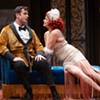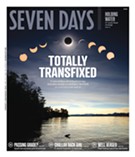Published March 22, 2006 at 10:40 p.m.
In the 81 years since Tennessee schoolteacher John Scopes was put on trial for teaching evolution, the tenor of the debate has shifted. Choleric, Bible-thumping creationists have become cool advocates of "intelligent design." Christian fundamentalists began a quiet campaign to take over school boards during the Reagan era. The results? More than a dozen states have put disclaimer stickers into biology textbooks or enacted thinly veiled mandates to squeeze religion into science classes.
Judicial and legislative battles are ongoing in 2006. Just last month, Utah's House of Representatives defeated an "Origins of Life" bill that threatened the teaching of evolution in high school. In 1955, playwrights Jerome Lawrence and Robert E. Lee foresaw the timelessness of the fury over the conclusions Charles Darwin drew from observing those unsuspecting Galapágos finches nearly a hundred years earlier. For the characters and storyline of Inherit the Wind, the authors hewed closely to the historical details of the 1925 Scopes "Monkey Trial." But in the play's introduction they sounded this prescient note: "The stage directions set the time as 'Not too long ago.' It might have been yesterday. It could be tomorrow."
It is today, as Vergennes' new community theater company, the Little City Players, showed in an ambitious and spirited production of Inherit the Wind. Director Jeffrey Fox skillfully marshaled an eager cast and used the physical layout of the Opera House imaginatively to conjure a lively "Heavenly Hillsboro, the buckle on the Bible Belt." Modernized references and props -- jets, Wal-Mart, Verizon, Phish, laptops, webcasting -- were somewhat jarring (and probably unnecessary), but served as not-so-subtle reminders that the dispute over Darwin rages on.
The central drama of the real-life Scopes trial was the clash of legal titans William Jennings Bryan and Clarence Darrow. Bryan, a three-time failed presidential candidate, perceived evolution as posing a threat to Christianity, and traveled the country giving speeches such as "The Menace of Darwinism" and "The Bible and its Enemies." Darrow, the most famous criminal defense attorney of the era, knew his client faced certain defeat in a local court, but hoped to get Tennessee's law banning evolution from the classroom eventually declared unconstitutional.
In the play, Bryan becomes Matthew Harrison Brady and Darrow is Henry Drummond. As Act I begins, teacher Bertram Cates is already in jail, unsure how he's going to defend himself. Hillsboro whips itself into a frenzy anticipating the trial. Moral indignation combines with the enticing prospect of increased business traffic, and enterprising townsfolk hawk Bibles. When Brady arrives, they greet him as a Messiah.
Cynical big-city columnist E.K. Hornbeck, of the Baltimore Herald, comes to cast sardonic witticisms among the rural bumpkins, and to tell Cates that his paper has hired the celebrated Drummond for the defense. The rhetoric ratchets up all around as the trial gets underway. But at an evening prayer meeting, the fiery Reverend Jeremiah Brown -- whose daughter, Rachel, is the teacher's colleague and girlfriend -- goes too far, even for Brady, by calling for God to strike down Cates and "let his soul writhe in anguish and damnation." Brady cautions the preacher with Solomon's wisdom from the Book of Proverbs: "He that troubleth his own house . . . shall inherit the wind."
This ominous warning hangs over the rest of the play. Brady seems invincible. He is the toast of Hillsboro. The courtroom gallery shouts "Amen" after every point he makes. The judge excludes all of Drummond's expert scientific witnesses, dismissing their testimony as irrelevant.
And yet Brady's case unravels as Drummond methodically questions the only witness the defense is allowed to call, an expert on the Bible: Brady himself. In a replay of Darrow's historic confrontation with Bryan, Drummond assails Brady's certainty in the Bible as literal fact. Did a whale really swallow Jonah? How long was the first day of Creation, if God didn't make the sun until Day Four? Twenty-four hours
. . . or 10 million years?
Brady stubbornly insists that faith trumps reason. But Drummond argues that even the faithful must agree: Man's ability to think is God's greatest gift. "An idea is a greater monument than a cathedral. And the advance of man's knowledge is more of a miracle than any sticks turned to snakes, or the parting of waters! . . . Why do you deny the one faculty which lifts man above all other creatures on the earth: the power of his brain to reason?" In the end, the struggle exhausts the combatants and victories are partial, and Pyrrhic, on both sides.
Rob Demic as Brady and John Hasen as Drummond handled their demanding roles with vigor and grace. Both actors resisted succumbing to melodrama as the lawyers traded barbs. Hasen -- an attorney in real life -- played Drummond as a thinking man; his eyes showed him processing ideas before he spoke. He also embodied a slight goofiness, appropriate to the quixotic nature of Drummond's uphill quest. Demic captured Brady's self-assurance with a broad smile and proud-shouldered body language. Under Drummond's withering cross-examination, this poise visibly crumbled.
As the Reverend Brown, Joe Garofalo portrayed a preacher from the fire-and-brimstone school. His gravely furrowed brow, scowling countenance and growling voice put the fear of God into Hillsboro's citizens. Newspaperman Horn- beck is the preacher's citified antithesis: cavalier, sarcastic and defiantly agnostic. Scott Remick played him with a light step and a twinkle in his eye. He was particularly delightful when bantering about the case with a furry monkey puppet.
The real star of the Little City production, however, was the gorgeous and inventively transformed Vergennes Opera House. Inherit the Wind requires both town and courtroom sets to be visible at all times. Set designer and technical director Allison Rimmer took out more than half of the usual seats. She reconfigured the remaining chairs on a semicircle of risers, so that the front of the house floor served as the courtroom interior and the stage behind it represented Hillsboro's town green. Beautifully lit by Neil Curtis, this layout felt both expansive and inviting.
Seating the townspeople and jury members among the audience during the trial enhanced the sense of intimacy and engagement. Minimal, elegant furnishings gave the ensemble cast ample room to roam. Director Fox moved traffic well -- crowd scenes had a naturalistic feel. The nearly two dozen actors rose to the challenge of spending lots of time on stage and reacting to the lead performers' dialogue without having many lines of their own. The ensemble worked well together, so fully committed to the story that they seemed as mesmerized by the action as their historical counterparts must have been by Bryan and Darrow in 1925.
Many actors created memorable characters from small moments or recurring idiosyncrasies. Ken Wolvington's Bible-selling Elijah was Hillsboro's holiest holy roller, with the loudest "Amens" at both the prayer meeting and the trial. As the prim and angular Judge, Stephanie Gallas wielded a thundering gavel. Jamie Watkins played the reluctant witness, high school student Howard Blair, with a charming mix of gawkiness and sincerity. Mark Ciociola's bailiff Meeker loomed with chiseled authority, while Jay Stetzel brought deadpan hilarity to feed-store clerk and juror George Sillers.
There were many bright lights in this Little City debut -- spunky actors from teens to seventysomethings, and remarkably polished production elements. The timeliness of the play and the enthusiasm of the Players made for an entertaining evening of community theater.
More By This Author
Speaking of...
-

Executive Director Kurt Thoma Leaves Barre Opera House
Mar 5, 2024 -

Vermonter's Musical Bound for Broadway With Hillary Clinton as a Producer
Oct 25, 2023 -

Phantom Theater Finds New Winter Venue in Waitsfield
Oct 13, 2023 -

Double E 2023 Summer Concert Series Kicks Off With the Wailers
Mar 17, 2023 -

Off Center for the Dramatic Arts to Reopen in the New North End
Sep 23, 2022 - More »
Comments
Comments are closed.
From 2014-2020, Seven Days allowed readers to comment on all stories posted on our website. While we've appreciated the suggestions and insights, right now Seven Days is prioritizing our core mission — producing high-quality, responsible local journalism — over moderating online debates between readers.
To criticize, correct or praise our reporting, please send us a letter to the editor or send us a tip. We’ll check it out and report the results.
Online comments may return when we have better tech tools for managing them. Thanks for reading.












































